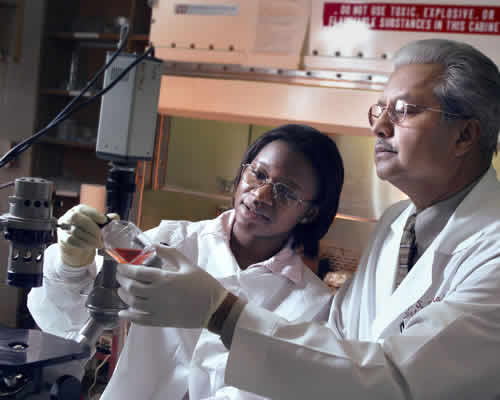“I enjoy the long nights spent in the bowels of Kunkel Hall trying to discover something that might make a difference,” says senior biology major Shirley Satuh of Navrongo, Ghana. Satuh is examining the effects of selenium on cancer cells as part of her year-long honors thesis.
Recent studies have indicated that selenium, a trace element found in the average daily diet, may prevent and help treat cancer. Satuh is tracing this process by looking at how selenium induces the death of cancer cells. She is also attempting to determine if the element affects healthy cells in the same manner.
Satuh, who is working under the guidance of Shyamal Majumdar, Kreider Professor of Biology, previously conducted a year-long independent study on the topic.
Majumdar has published about 100 papers with Lafayette students and co-edited over 25 books. Editor of The Journal of the Pennsylvania Academy of Science, his publications last year included an article coauthored with a Lafayette student and faculty member in International Journal of Ecology and Environmental Sciences and editing the books Renewable Energy: Trends And Prospects and Science, Technology and National Security.
“I realized that I had more questions than when I started,” says Satuh “In the beginning, we were concerned with what the selenium did. When we saw the results, I began thinking about how the element does this. It is amazing that even something as minute as cell death is a complex system of checks and balances.”
Satuh was inspired to do the research after losing a close cousin to leukemia.
“Hopefully, I will be able to contribute to the understanding of this horrible yet fascinating condition,” she says.
Majumdar calls Satuh a “dedicated, hard-working, conscientious and dependable researcherThis type of work is not something that can be finished in a short period of time,” he explains. “Shirley is willing to work at night and on weekends to complete her research. She is also always ready to replicate her results.
“This project is giving her an opportunity to work independently, and she is experiencing the frustration that comes with research and effectively coping with problems. These qualities will help Shirley get into a graduate program in her field of study.”
Satuh calls Majumdar an extremely hard worker and adds that “he is thorough in his thought process and communicates what needs to be done, but gives me a lot of freedom to find new ways of solving problems.”
She also cites assistant professors of biology Elaine Reynolds and Robert Kurt as invaluable sources of advice and encouragement.
“I would not be able to carry out this type of project in many undergraduate settings,” says Satuh. “Lafayette has the resources, both human and material, to encourage a stimulating environment.”
“I have shown many prospective students around my lab and told them, if you want to be the type of biology student who sits in the library reading all day, don’t come to Lafayette, but if you want biology on the cutting edge of technology and a school where you can design the course of your undergraduate career while working with some of the giants in the field and the newest technology, then this is the place for you.”
Satuh is a member of International Students Association, Association of Black Collegians, and Lafayette African and Caribbean Students Association. A Bible study leader for Lafayette Christian Fellowship, she is a hospital volunteer and participates in the Alternative School Break and Adopt-a-Grandparent programs. Satuh is also a teaching assistant for electron microscopy and tissue culture and bacteriology courses.

A National Leader in Undergraduate Research. Shirley Satuh ’03 made a presentation on her collaborative research with Shyamal Majumdar, Kreider Professor of Biology, at the annual meeting of the Pennsylvania Academy of Science.
